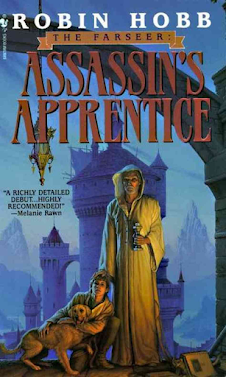A query, an outline, and a synopsis walk into a bar, and a writer/bartender shoots themself. Publishers and agents often want one or all of these thinga-ma-jobbies*. Any advice for writers who are flummoxed by how to create them?
*In Scotland,"jobbie" means turd. An extra layer of meaning to the question, I say.
And onto the question - which is three separate questions. Or rather, it's one question about writing and two questions about not-writing.
The question about writing is "how to outline". My answer is . . . not a clue. Not a scooby-doo. My guess would be . . . write down what's going to happen in the book you're planning?
If you're a outliner/plotter, or think it sounds like fun, scroll down and read Eric's post from yesterday. If you're a non-outliner/pantser, or think it sounds like fun, then come with me, Gentle Reader. But either way, don't worry about it. Neither method, nor any mixture of them, is better or worse than the other and it won't show up in the finished book.
 |
| Pantsing that first draft is messy, mind you |
I hope no one mistakes my "dunno" for veiled advice. The related and frequent question "Should we or shouldn't we outline?" is unanswerable. God, I wish it was unaskable. It doesn't matter! We are all free to write that Anne-Lamotty first draft or produce a lavish outline and I cannot for the life of me work out why anyone cares what anyone else does. It's right up there with "Mac or PC".
However, the other two bits of the question - regarding queries and synopses - are a different matter entirely. If we want to pursue tradional publishing, with an agent, we need to write queries and synopses. How? Well, I would say we need to pull on our big knickers, remind ourselves that there is no job in the world where every last sub-task is pure joy, and crack on with it. It's not writing; it's not worth the angst of a writer.
Querying is admin. Hang on, not quite. But it is ancillary to writing, like choosing a laptop or attending a convention. So it's fine - maybe even preferable - if your query letter is brisk and business-like even though your prose style is lush and lyrical. I'd say a good start would be Janet Reid's Query Shark website. Anything I wrote here would be duplication. Maybe even theft.
Synopses are admin. No, they're not, but I liked the echo. It too is ancillary to writing, like designing new bookmarks or updating a website. It won't be a surprise to hear that I can't write synopses until I've finished the first draft of the book - until I've chipped it out of the ground without breaking any bits off, as Stephen King puts it. Which is not to say I've never done it. I've recently written one-page synopses for books 7, 8 & 9 in the Last Ditch Motel series - complete with titles - and I'm hoping that A. I forget what I promised before I try to write it and B. no one at Severn House holds me to it over the next few years. They're more aspirations than they are manifestos.
My only further advice is to miss out great big chunks - whole sub-plots and entire characters - rather than trying to snip away until you've got a smidge of everything. It's like a buffet: I'd always rather have a lot of a little than a little of a lot.
As well as that, I'd advise to name the main character early. Mary Higgins Clark's method of starting each chapter with a character's name has never been bettered, as a way of handling POV switches: so simple, so effective. The same goes for synopses. The fewest further characters you can get away with naming, the better.
 |
| I've read every word she ever wrote |
Also, I'd counsel you to say where the book takes place. Does that sound too obvious? Would you prefer to allude to a landmark or a custom, rather than say "in Chicago" or "across England"? I'm not convinced a synopsis is the place to be leaving a trail of breadcrumbs, frankly. Even if the book itself is a crime novel with twists like a pretzel that's needing a pee. Because synopses aren't writing.
Cx




















